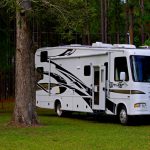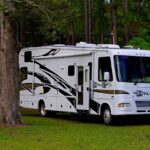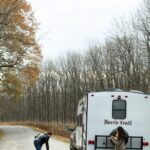Picture this: you’ve just parked your RV in the perfect spot, ready to settle in for the season—or maybe even year-round. But as the days go by, you realize that without the right gear, your dream home-on-wheels can quickly turn into a frustrating, uncomfortable experience. From battling freezing pipes in winter to keeping bugs out of your outdoor space, stationary RV living comes with its own unique challenges—and that’s exactly why we’ve put together this ultimate list of 15 must-have essentials to keep your rig cozy, efficient, and ready for anything.
Did you know that proper insulation like Reflectix can block up to 96% of radiant heat, drastically improving your RV’s temperature control? Or that a keyless entry system like RVLock not only adds convenience but also peace of mind when you’re parked for months at a time? Stick around as we unpack these and more game-changing items that will transform your stationary RV into the ultimate home base.
Key Takeaways
- Protect your investment with tire and wheel covers, RV skirting, and quality surge protectors.
- Stay comfortable year-round using Reflectix insulation, heated water hoses, and space heaters.
- Boost convenience and security with keyless entry locks and reliable power backup systems.
- Maximize your living space by organizing smartly and creating cozy outdoor areas with screen tents and lighting.
- 👉 Shop smart at trusted retailers like Amazon, Camping World, and official brand sites for gear like Camco hoses, RVLock, and Progressive Industries surge protectors.
CHECK PRICE on essentials like:
- Classic Accessories Tire Covers | Camping World
- RVLock Keyless Entry | RVLock Official Website
- Camco Heated Drinking Water Hose | Camping World
Ready to make your stationary RV living experience the best it can be? Let’s dive in!
Table of Contents
- ⚡️ Quick Tips and Facts About Stationary RV Living Must-Haves
- 🏕️ The Evolution of Stationary RV Living: From Road Trips to Home Base
- 🛠️ 15 Essential Stationary RV Living Must-Haves for Comfort & Convenience
- ❄️ Winterproofing Your Stationary RV: Must-Have Gear for Cold Weather Living
- 🔌 Power Up! Best Energy Solutions and Backup Systems for Stationary RVs
- 💧 Water Management Essentials: Staying Hydrated and Waste-Free in Your Stationary RV
- 🌿 Creating a Cozy Outdoor Living Space: Patio and Garden Must-Haves
- 🧹 Maintenance & Storage Tips for Stationary RV Owners: Protect Your Investment
- 📦 Organizing Your Stationary RV: Space-Saving Hacks and Storage Solutions
- 🛒 Where to Shop: Top Online Retailers and Brands for Stationary RV Essentials
- 🎯 FAQs: Your Burning Questions About Stationary RV Living Must-Haves Answered
- 🏁 Wrap-Up: Our Ultimate Stationary RV Living Must-Haves Checklist
- 🔗 Recommended Links for Stationary RV Living Resources
- 📚 Reference Links and Further Reading
⚡️ Quick Tips and Facts About Stationary RV Living Must-Haves
Welcome to the ultimate guide for stationary RV living must-haves! Whether you’re parking your home-on-wheels for a season or settling in for the long haul, having the right gear can make all the difference between “just surviving” and thriving in your RV lifestyle. At RV Brands™, we’ve been down this road (or rather, parked on it!) countless times, and we’re here to share the essentials that keep your rig comfy, efficient, and ready for anything.
Quick facts to kick things off:
- Stationary RV living is increasingly popular as folks seek affordable, flexible housing options. (Check out our deep dive on Is It Really Cheaper to Live in an RV Than a Home? 15 Truths (2025) 🚐)
- UV rays and weather exposure can degrade your RV’s exterior fast — tire and wheel covers are a must-have to protect your investment.
- Reflectix insulation can block up to 96% of radiant heat, keeping your rig cooler in summer and warmer in winter.
- Keyless entry systems like RVLock add convenience and security, especially when you’re stationary and want to roam freely.
- Winterizing gear such as heated hoses and skirting can save you from costly repairs and discomfort during cold months.
Pro tip: Don’t underestimate the power of a good outdoor living setup — your campsite can be an extension of your home!
Ready to dive deeper? Let’s roll into the full list of essentials and insider tips that will transform your stationary RV experience.
🏕️ The Evolution of Stationary RV Living: From Road Trips to Home Base
Stationary RV living isn’t just about parking your rig and calling it a day. It’s a lifestyle shift — from the nomadic road warrior to a settled, yet still mobile, homeowner. The trend has exploded as more people seek affordable housing alternatives, especially in scenic or community-rich locations.
Why Stationary RV Living?
- Cost savings: Lower rent or mortgage costs, reduced utility bills, and fewer maintenance surprises.
- Flexibility: You can still move if you want, but you’re not forced to pack up every week.
- Community: Many RV parks and resorts foster tight-knit communities with events, shared amenities, and social opportunities.
- Customization: Stationary living lets you personalize your space more extensively than transient RVing.
Historical Snapshot
Back in the 1950s and 60s, stationary RV living was mostly seasonal — retirees escaping harsh winters. Today, it’s a year-round lifestyle choice for all ages, thanks to advances in RV technology, solar power, and internet connectivity.
For more on the lifestyle and how it fits into the broader RV world, check out our Full-Time RVing category.
🛠️ 15 Essential Stationary RV Living Must-Haves for Comfort & Convenience
Let’s get to the heart of the matter: what gear should you absolutely have when living stationary in your RV? We’ve compiled a list of 15 must-haves that cover everything from protection to comfort to functionality.
| Item | Design (1-10) | Functionality (1-10) | Durability (1-10) | Overall (1-10) |
|---|---|---|---|---|
| Tire & Wheel Covers | 8 | 9 | 9 | 9 |
| Reflectix Insulation | 7 | 10 | 8 | 8.5 |
| Keyless Entry Lock (RVLock) | 9 | 9 | 8 | 8.5 |
| Surge Protector | 8 | 10 | 9 | 9 |
| Drinking Water Safe Hose | 7 | 9 | 8 | 8 |
| Sewer Hose Kit | 7 | 9 | 7 | 7.5 |
| Leveling Blocks | 8 | 9 | 8 | 8.5 |
| Stabilizers | 7 | 8 | 8 | 7.5 |
| Wheel Chocks | 8 | 9 | 9 | 8.5 |
| Roadside Emergency Kit | 9 | 9 | 8 | 8.5 |
| Spare Tire | 8 | 10 | 9 | 9 |
| Electrical Adapters & Extension Cords | 8 | 9 | 8 | 8.5 |
| Maxx Air Fan | 9 | 9 | 8 | 8.5 |
| Space Heater (Lasko) | 8 | 9 | 7 | 8 |
| Dehumidifier (Kesnos) | 7 | 8 | 7 | 7.5 |
Tire & Wheel Covers
Why you need them: Protect your tires and wheels from UV damage, dirt, and moisture — especially important when your RV is parked for months. We recommend Classic Accessories OverDrive Tire Covers for their durability and weather resistance.
Pro tip: Look for four-season covers with vents to prevent moisture buildup and mildew.
Reflectix Insulation
This reflective insulation is a game-changer for stationary RV living. It’s easy to install on windows and doors, reflecting heat away in summer and retaining warmth in winter. We’ve personally seen a noticeable drop in interior temps during hot southern summers after installing Reflectix.
Keyless Entry Lock (RVLock)
Forget fumbling for keys! The RVLock Keyless Entry System offers a light-up keypad and remote locking, perfect for stationary living when you might have visitors or want quick access without keys.
❄️ Winterproofing Your Stationary RV: Must-Have Gear for Cold Weather Living
Winter in your stationary RV can be cozy — or a nightmare. The difference? The right gear.
Heated Drinking Water Safe Hose
A standard water hose can freeze, cutting off your water supply and risking damage. Heated hoses like the Camco TastePURE Heated Drinking Water Hose keep water flowing and safe to drink, even in freezing temps.
Winter Skirting Materials
Adding skirting around your RV’s base traps heat and reduces wind chill. Vinyl skirting is durable and compact, but if you’re on a budget, DIY tarps can work temporarily.
Space Heater
While your RV furnace does the heavy lifting, a small electric space heater (like the Lasko Ceramic Tower Heater) can provide quick, supplemental warmth — especially handy if propane runs low.
🔌 Power Up! Best Energy Solutions and Backup Systems for Stationary RVs
When you’re stationary, power needs shift from short bursts to sustained supply. Here’s what you need:
- Surge Protector: Protects your RV’s electrical system from voltage spikes. We recommend the Progressive Industries EMS-HW30C for its reliability and diagnostics.
- Solar Panels: Solar setups like those from Renogy can supplement or replace campground power, giving you independence and savings.
- Backup Generator: A quiet, fuel-efficient generator such as the Honda EU2200i can be a lifesaver during outages.
💧 Water Management Essentials: Staying Hydrated and Waste-Free in Your Stationary RV
Water is life, and managing it well is key to comfortable stationary living.
- Drinking Water Safe Hose: As mentioned, a must-have for clean water.
- Sewer Hose Kit: A quality kit like the Camco RhinoFLEX makes waste disposal easier and cleaner.
- Water Filtration: Systems like the Clearsource RV Water Filtration System improve water taste and safety.
- Water Heater Maintenance: Regular flushing and anode rod checks extend your water heater’s life.
🌿 Creating a Cozy Outdoor Living Space: Patio and Garden Must-Haves
Your campsite is your backyard! Here’s how to make it inviting:
- Clam Screen Tent: Keeps bugs out while letting you enjoy fresh air.
- Outdoor Furniture: Invest in durable camp chairs and a foldable table.
- String Lights: Fairy lights add ambiance and charm.
- Container Garden: Grow herbs or flowers in pots to brighten your space.
🧹 Maintenance & Storage Tips for Stationary RV Owners: Protect Your Investment
Long-term stationary living means maintenance is critical.
- RV Cover: Protects from sun, rain, and debris. Look for breathable, water-resistant covers like those from Classic Accessories.
- Tire Pressure Monitoring: Keep tires inflated to prevent flat spots.
- Regular Cleaning: Prevent mold and mildew by cleaning and airing out your RV.
- Storage Containers: Waterproof bins keep seasonal gear safe and organized.
📦 Organizing Your Stationary RV: Space-Saving Hacks and Storage Solutions
Space is precious, even when parked.
- Pull-Out Pantry Drawers: Make accessing food easier and organized.
- Ottoman with Storage: Dual-purpose furniture saves space.
- Command Strips & Velcro: Decorate without damaging walls.
- Jewelry Holders & Spice Racks: Keep small items tidy and accessible.
🛒 Where to Shop: Top Online Retailers and Brands for Stationary RV Essentials
Here’s where we recommend hunting for your stationary RV must-haves:
- Amazon: Huge selection and fast shipping for everything from Reflectix to space heaters.
- Camping World: Specialized RV gear and expert advice.
- Walmart: Affordable basics and seasonal items.
- RVShare: Great for renting or buying used gear.
- Brand Official Sites: For guaranteed authenticity and warranties (e.g., Camco, Renogy).
👉 CHECK PRICE on:
- Classic Accessories Tire Covers: Amazon | Camping World
- RVLock Keyless Entry: Amazon | RVLock Official Website
- Camco Heated Drinking Water Hose: Amazon | Camping World
🎯 FAQs: Your Burning Questions About Stationary RV Living Must-Haves Answered
Q: Can I use regular water hoses for my RV?
❌ No! Regular garden hoses can leach chemicals and aren’t safe for drinking water. Always use a drinking water safe hose.
Q: How often should I winterize my stationary RV?
✅ Annually, before the first freeze. Use heated hoses and skirting to protect plumbing.
Q: Are solar panels worth it for stationary RV living?
✅ Absolutely! They reduce reliance on campground power and save money long-term.
Q: What’s the best way to keep bugs out of my outdoor space?
✅ A clam screen tent or similar screened enclosure works wonders.
🏁 Wrap-Up: Our Ultimate Stationary RV Living Must-Haves Checklist
Here’s your quick-reference checklist to keep your stationary RV life smooth and enjoyable:
- Tire & wheel covers
- Reflectix insulation
- Keyless entry lock
- Surge protector
- Drinking water safe hose (heated for winter)
- Sewer hose kit
- Leveling blocks & stabilizers
- Wheel chocks
- Roadside emergency kit & spare tire
- Electrical adapters & extension cords
- Maxx Air fan or equivalent ventilation
- Space heater for cold months
- Dehumidifier for moisture control
- Outdoor living gear (screen tent, furniture, lights)
- RV cover for long-term protection
With these essentials, your stationary RV will feel like a true home base — comfortable, secure, and ready for whatever adventure comes next.
🔗 Recommended Links for Stationary RV Living Resources
- Full-Time RVing Tips & Tricks
- Luxury RVs for Stationary Living
- Fifth Wheel RVs: Best Models for Stationary Life
- Fifth Wheel RV Manufacturers
- Is It Really Cheaper to Live in an RV Than a Home? 15 Truths (2025) 🚐
📚 Reference Links and Further Reading
- Classic Accessories OverDrive Tire Covers on Amazon
- RVLock Keyless Entry System Official Site
- Camco Heated Drinking Water Hose Product Page
- Progressive Industries Surge Protector EMS-HW30C
- Renogy Solar Panel Kits
- Honda EU2200i Generator
- Fulltime Families Stationary RV Living Guide
- Cinders Travels Stationary RV Living Essentials
- Cool Mom and Collected RV Must-Haves
Ready to make your stationary RV feel like a dream home? Stick with us for the best gear, tips, and insider secrets from the RV Brands™ team! 🚐✨
Conclusion
After exploring the ins and outs of stationary RV living must-haves, it’s clear that preparation and the right gear are your best friends when settling into a stationary lifestyle. From protective tire covers and Reflectix insulation to keyless entry systems and winterizing essentials, each item plays a vital role in making your RV feel like a true home base.
Positives:
- Many of these products, like the Classic Accessories Tire Covers and RVLock Keyless Entry, offer durability, convenience, and peace of mind.
- Insulation and heated hoses significantly improve comfort and protect your rig from weather extremes.
- Outdoor living gear and smart storage solutions expand your usable space and enhance your quality of life.
Negatives:
- Some items, such as vinyl skirting or solar panel setups, can require upfront investment and installation effort.
- Space heaters and dehumidifiers need careful use to avoid safety risks or excessive power consumption.
Our confident recommendation: Invest in quality, durable essentials first—especially those that protect your RV’s structure and utilities. Then, layer in comfort and convenience upgrades to truly make your stationary RV a cozy, efficient home. With the right setup, you’ll enjoy all the benefits of RV living without the constant packing and moving.
Remember that stationary RV living is a lifestyle choice that blends the freedom of mobility with the stability of a home. By following our checklist and tips, you’ll be well on your way to mastering this unique way of life.
Recommended Links for Shopping & Resources
👉 CHECK PRICE on:
-
Classic Accessories Tire Covers:
Amazon | Camping World -
RVLock Keyless Entry System:
Amazon | RVLock Official Website -
Camco Heated Drinking Water Hose:
Amazon | Camping World -
Progressive Industries Surge Protector EMS-HW30C:
Amazon | Progressive Industries Official -
Renogy Solar Panel Kits:
Amazon | Renogy Official Website -
Honda EU2200i Generator:
Amazon | Honda Power Equipment
Recommended Books on RV Living:
- The RV Handbook: Essential How-to Guide for the RV Owner by Dave Solberg — Amazon Link
- Living the RV Life: Your Ultimate Guide to Life on the Road by Marc and Julie Bennett — Amazon Link
- Full-Time RV Living: The Ultimate Guide by Mike and Jennifer Wendland — Amazon Link
🎯 FAQs: Your Burning Questions About Stationary RV Living Must-Haves Answered
What are the essential appliances for stationary RV living?
When you’re parked long-term, appliances that combine efficiency, space-saving, and comfort are crucial. Key essentials include:
- Refrigerator: Preferably a 12V or propane-powered model with good insulation, such as those from Dometic or Norcold.
- Microwave/Convection Oven: For quick meals without heating the whole rig.
- Maxx Air Fan or Ventilation System: Keeps air circulating and reduces moisture buildup.
- Space Heater: A safe, efficient heater like the Lasko Ceramic Tower Heater supplements your furnace in winter.
- Dehumidifier: Controls moisture to prevent mold and mildew, especially in humid climates.
These appliances balance power consumption and functionality, making your stationary RV a comfortable home.
How do I optimize my RV’s storage space for long-term living?
Storage is king in RV living! Here’s how to maximize it:
- Use multi-functional furniture: Ottomans with storage, fold-out tables, and beds with under-mattress compartments.
- Install pull-out pantry drawers: They make accessing food and supplies easier and organized.
- Utilize vertical space: Hooks, command strips, and Velcro tape allow hanging items without damaging walls.
- Waterproof storage containers: Ideal for seasonal gear stored under the RV or in exterior compartments.
- Declutter regularly: Keep only what you need to avoid overcrowding.
Optimizing storage keeps your living space functional and stress-free.
What are the best upgrades for stationary RVs to improve comfort and functionality?
Upgrades that pay off in comfort and convenience include:
- Reflectix window insulation: Helps regulate temperature year-round.
- Keyless entry systems (e.g., RVLock): Adds security and ease of access.
- Solar power kits: Provide energy independence and reduce campground power costs.
- Outdoor living gear: Screen tents, quality camp chairs, and string lights extend your living space.
- Upgraded water filtration: Systems like Clearsource improve water quality for drinking and bathing.
These upgrades transform your RV into a cozy, efficient home.
What are the top considerations for choosing the right RV park or location for stationary living?
Choosing your stationary spot is as important as your gear:
- Community: Look for parks with active social scenes if you want to connect with neighbors.
- Amenities: Reliable hookups (electric, water, sewer), Wi-Fi, laundry, and security.
- Climate: Consider weather patterns and how they affect your RV and lifestyle.
- Accessibility: Proximity to shopping, healthcare, and recreation.
- Rules & Length of Stay: Some parks limit how long you can stay stationary.
Research and visit potential parks to find the best fit for your needs.
📚 Reference Links and Further Reading
- Classic Accessories Official Site
- RVLock Keyless Entry System
- Camco Products
- Progressive Industries Surge Protectors
- Renogy Solar Panels
- Honda Power Equipment
- Fulltime Families: Stationary RV Living Guide
- Cinders Travels: Stationary RV Living Essentials
- Cool Mom and Collected: RV Must-Haves
Thanks for sticking with us through this deep dive! With these insights and gear recommendations, your stationary RV living adventure is set to be comfortable, efficient, and downright enjoyable. See you on the road—or parked perfectly! 🚐✨




